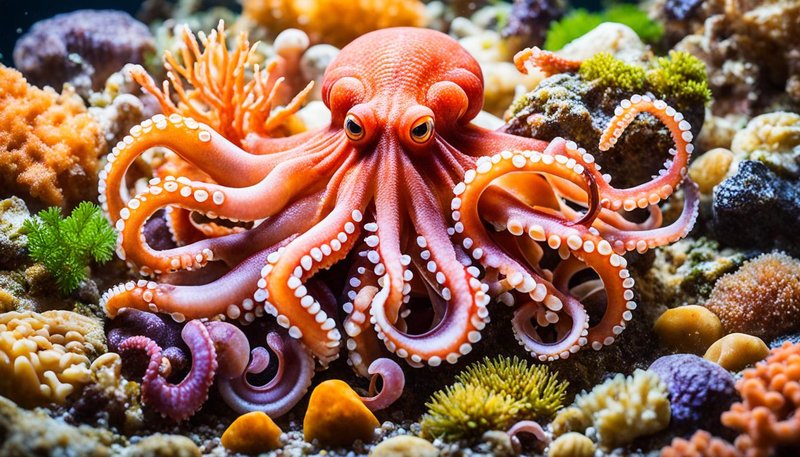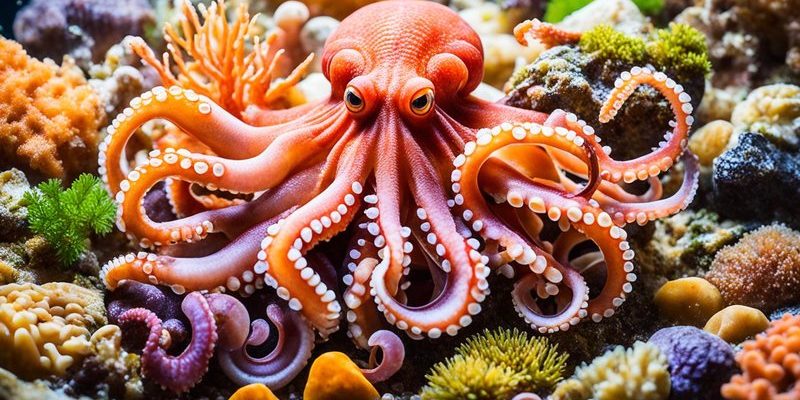
Imagine sitting across from a friend at your favorite café, enjoying a good cup of coffee as you share stories about your favorite foods. You might compare the octopus’s feeding habits to a skilled chef selecting the best ingredients for a gourmet dish. Just as a chef has preferences and techniques, the octopus has specific food choices and methods that make it a unique predator in the ocean’s kitchen. So, let’s unwrap the octopus’s culinary secrets!
What Do Octopuses Eat?
Octopuses are designed for hunting, and their diet reflects that. They enjoy a varied menu of marine life, including:
- Crustaceans: Shrimp, crabs, and lobsters are some of their favorites.
- Fish: They won’t hesitate to go after small fish, using their stealth to catch them.
- Mollusks: Other types of mollusks like clams and snails are also on the menu.
You might be wondering how they catch their food. Well, the octopus employs a mix of camouflage and clever tactics, often hiding in plain sight. With their ability to change color and texture, they can blend seamlessly into their surroundings, waiting patiently for the right moment to strike. When prey comes close, they can reach out with their long arms to grab it quickly.
Each octopus species has slightly different favorites. Some might prefer the taste of crabs, while others might go for fish. In essence, they are opportunistic feeders, adapting their diets based on what’s available in their habitat.
How Do Octopuses Hunt?
Hunting for an octopus is an art form. They use a combination of intelligence, stealth, and physical agility to catch dinner.
Here’s a closer look at how they do it:
- Camouflage: Octopuses can change their color to match their environment. This allows them to hide from both predators and prey.
- Ambush: They often wait quietly, camouflaged and still, until a snack wanders too close.
- Speed: When the moment is right, they spring into action. Using their arms and a jet of water, they can surge forward to snatch their meal.
For example, if an octopus spots a crab scuttling across the seabed, it might mimic the sandy floor, lying completely still. Then, with a quick movement, it can grab the unsuspecting crab before it even realizes what’s happening. This combination of patience and sudden action is what makes them such successful hunters!
Feeding Techniques of the Octopus
Octopuses have several fascinating techniques for consuming their prey, showcasing just how adaptable and clever they are.
One of the most interesting strategies is their use of their beak. Unlike fish that might gulp down food in large bites, octopuses have a sharp, powerful beak—similar to a parrot’s—that they use to puncture the shells of their prey.
Once they break through the shell, they secrete enzymes to help digest their food externally before sucking up the nutrients. It’s a bit like making a soup, where they break down the ingredients into a slurpable meal.
They also have a remarkable ability to manipulate their arms to bring food to their mouths, which makes the whole process extremely efficient. Imagine having eight hands that work automatically to feed you—pretty cool, right?
Feeding Habits Based on Habitat
The habitat of an octopus plays a big role in its diet. Octopuses are found in a variety of marine environments, from coral reefs to deep ocean floors. Each setting influences what they eat.
In coral reefs, where biodiversity is higher, octopuses might feast on a wider range of fish and crustaceans. Conversely, those residing in deeper waters may rely more on scavenging, using their keen eyesight to find food in dimly lit areas.
Interestingly, some octopuses have been observed using tools while hunting. For example, they’ve been seen using coconut shells or rocks as shields to hide from predators or to ambush prey. This adaptability shows their intelligence and helps them thrive in diverse environments.
Behavioral Patterns in Feeding
Octopus feeding behavior can vary based on factors such as time of day and season. Many octopuses are nocturnal, meaning they’re most active at night when they do most of their hunting. This nighttime activity allows them to avoid larger predators while capitalizing on the movements of unsuspecting prey.
During their active hours, they often track the movements of fish and crustaceans, using their intelligence to predict where their food might go. Think of it like a game of chess, where the octopus anticipates the moves of its opponents before making its own.
Moreover, octopuses have been known to engage in playful behavior while hunting. For instance, they might toss around shells or play with small objects, which can help them develop skills necessary for capturing prey effectively.
How Octopus Diet Affects Their Health
Just like us, octopuses need a balanced diet to stay healthy. A varied diet ensures they get the right nutrients to function well. For example, eating crustaceans contributes essential calcium for their beaks and shells, while fish provide the protein necessary for growth and repair.
If the food supply dwindles due to environmental changes or overfishing, it can impact octopus populations. Lack of food may lead to nutritional deficiencies, affecting their ability to hunt or even reproduce.
In aquariums, where octopuses are kept in controlled environments, their diet is carefully monitored to ensure they get everything they need. Aquarists often provide a mix of fresh seafood to mimic their natural diet, keeping the octopus healthy and active.
The diet and feeding habits of the octopus are as intriguing as the creatures themselves. From their varied menu choices to their clever hunting techniques, octopuses showcase a remarkable blend of intelligence and adaptability. Whether they’re lurking in coral reefs or navigating the deep sea, these fascinating animals have evolved to thrive in changing environments and conditions.
So next time you think about the ocean’s wonders, remember the octopus and its unique approach to dining. They aren’t just passive inhabitants of the sea; they are skilled predators, constantly adapting, hunting, and feasting in a world full of mystery and beauty.

